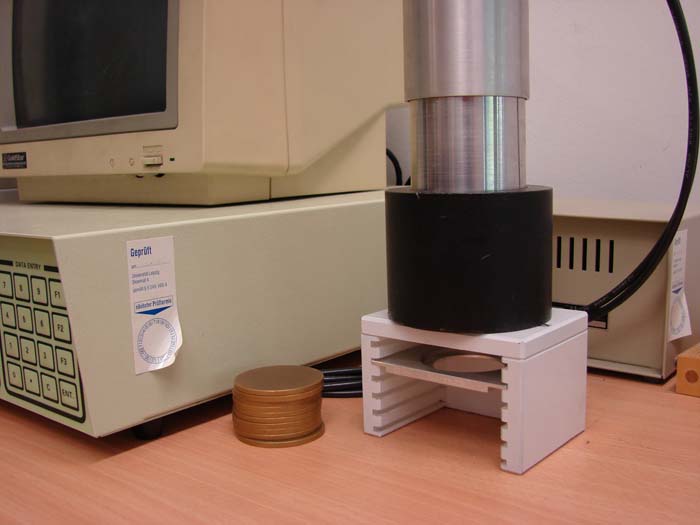ISO 18589-6 Alpha Spectrometry for Radium Isotopes
The ISO 18589 standard series is a cornerstone in the field of radiometric analysis, particularly when it comes to measuring radium isotopes through alpha spectrometry. This service specifically adheres to ISO 18589-6, which provides a comprehensive approach for the determination of alpha-emitting radionuclides in various samples, including those found in environmental and industrial settings.
The process involves several critical steps. Initially, the sample is prepared by ensuring it is free from interference that could affect measurement accuracy. This might include filtering or dissolving the sample to ensure homogeneity. The subsequent step involves activation, where a known amount of radium is introduced into the sample for analysis. The use of high-purity materials and precise calibration are essential in this phase.
Once prepared, the samples are analyzed using alpha spectrometry instrumentation that adheres strictly to ISO 18589-6 specifications. This equipment typically includes a germanium detector coupled with an ionization chamber, designed for optimal sensitivity and resolution. The instrument's calibration is critical; it ensures accurate readings by aligning with known standards.
The measurement process itself involves irradiating the sample in a controlled environment to induce alpha emissions. These emissions are then detected by the spectrometer, which records their energy levels. The data collected is analyzed to determine the presence and concentration of radium isotopes within the sample. This analysis must comply with ISO 18589-6, ensuring that results are consistent and reliable.
The final report generated from this process details the findings in a manner compliant with international standards, providing a clear understanding of the radium content in the analyzed material. This information is invaluable for quality managers, compliance officers, R&D engineers, and procurement professionals who require accurate and consistent data regarding radium isotopes.
Accurate measurement of radium isotopes through alpha spectrometry is not just a technical exercise but also carries significant implications for public health and environmental safety. The results from this analysis can influence decisions in waste management, environmental remediation projects, and nuclear fuel cycle processes. It ensures that regulatory standards are met and provides data crucial for the safe handling of radioactive materials.
- Sample preparation: Ensuring homogeneity and freedom from interference.
- Activation: Introducing known radium into samples to facilitate accurate measurement.
- Instrumentation: Using high-purity detectors calibrated according to ISO 18589-6 standards.
- Data analysis: Applying rigorous analytical methods to derive precise concentrations of radium isotopes.
The reliability and accuracy of these measurements are paramount, making this service indispensable for industries dealing with radioactive materials. By adhering strictly to ISO 18589-6 guidelines, the laboratory ensures that its reports are internationally recognized and accepted, thereby enhancing trust and credibility in compliance processes.
Why It Matters
The measurement of radium isotopes through alpha spectrometry is crucial for several reasons. Firstly, it aids in environmental monitoring by identifying and quantifying radium contamination levels, which can pose health risks if not controlled properly. This service is particularly important in areas where historical activities such as mining or nuclear testing have left a legacy of radioactive waste.
Secondly, the accurate measurement of radium isotopes ensures compliance with international regulations set by bodies like the International Atomic Energy Agency (IAEA) and national regulatory authorities. Compliance is essential for avoiding legal penalties and maintaining public trust in nuclear safety practices.
In industrial settings, such as nuclear fuel reprocessing plants or radioactive waste storage facilities, precise measurement of radium isotopes helps in optimizing processes and ensuring worker safety. By minimizing exposure to harmful levels of radiation, this service contributes significantly to occupational health and safety standards.
Additionally, the data generated from these analyses can support long-term environmental remediation projects, providing crucial insights into the extent of contamination and guiding the development of effective mitigation strategies. This information is vital for stakeholders involved in environmental protection initiatives, ensuring sustainable practices are adopted.
Quality and Reliability Assurance
The quality and reliability of results from ISO 18589-6 alpha spectrometry are underpinned by stringent quality assurance protocols. These include regular calibration checks to ensure that the equipment remains accurate over time. The use of certified reference materials (CRMs) for calibration is a key aspect, ensuring that all measurements can be traced back to international standards.
Another critical element in maintaining reliability is the implementation of robust quality control measures during sample preparation and analysis. This involves meticulous documentation of each step taken during the process, including temperature control, irradiation time, and detector settings. The use of advanced software for data processing further enhances accuracy by minimizing human error.
The laboratory employs experienced personnel trained in both analytical techniques and regulatory requirements to perform these analyses. Continuous training ensures that staff are up-to-date with the latest methodologies and best practices recommended by international standards such as ISO 18589-6. This commitment to excellence translates into consistent, reliable results every time.
The quality assurance framework also includes periodic external audits conducted by independent bodies recognized for their expertise in nuclear and radiological sciences. These audits verify that the laboratory adheres strictly to established protocols and maintains high standards throughout its operations.
International Acceptance and Recognition
The ISO 18589-6 alpha spectrometry service is widely recognized internationally for its accuracy and reliability. Compliance with this standard ensures that the results generated are accepted by regulatory authorities across different countries, thereby facilitating seamless cross-border collaboration.
Nations like Canada, France, Germany, Italy, Japan, South Korea, Spain, Switzerland, and the United States have adopted ISO 18589-6 as a benchmark for radiometric analysis. This international recognition is particularly beneficial in sectors such as nuclear energy, environmental protection, and waste management.
The service's global acceptance extends beyond mere compliance; it also fosters trust among stakeholders who rely on accurate data to make informed decisions. By adhering to these standards, the laboratory not only meets regulatory requirements but also sets a benchmark for excellence in radiometric analysis.





